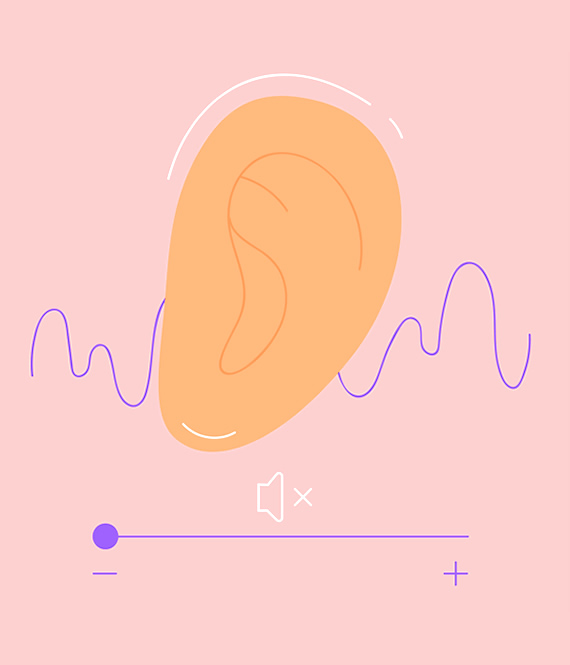
7 Hearing Loss Symptoms That Indicate a Poor Ear Function
We recommend helpful products in our articles. Read our full disclosure here. The content on this website is not intended to be a substitute for professional advice, diagnosis, or treatment.
Hearing loss symptoms can start to occur at any age.
However, aging in particular can affect our hearing the most – especially when the hair cells in the inner ear are exposed to loud noises, chemicals, cleansing solutions, and crowded places.
All of these factors can kill ear cells which transform sound waves into nerve signals that are processed by the brain.
These cells are crucial for listening to music and sounds.
Hearing loss in men is three times as likely as compared to women as they tend to work in noisy environments.
Nearly 50% of people over the age of 75 have lost their hearing.
Most are at a point where they require hearing aids.
If you or your loved one notice one or several hearing loss symptoms, it is a good idea to consult medical care professionals that specialize in hearing loss treatments (like HearCanada).
And if you are not sure of what exactly hearing loss symptoms are, then this guide is for you.
7 Common Hearing Loss Symptoms That Shouldn’t Be Ignored
1. Following Conversations Becomes Difficult
This is one of the hearing loss symptoms people notice first.
A person experiencing hearing loss will start to find it difficult to engage and keep up with a conversation.
This is because facial expressions, lip reading, and context are not sufficient for a long talk.
A person needs to be able to hear to respond correctly.
The best way to know if you are truly losing your hearing is to take notice of family, friends, or loved ones.
See if they often:
- Complain about you not listening to them;
- Get confused because you are responding incorrectly;
- Say that you ask them to repeat too often.
2. You Feel Irritated and Confused
Aging causes people to lose the ability to grab high-frequency sounds.
This includes consonant sounds and digraphs which make it difficult to understand sentences.
Patients will be only able to hear the sound of vowels which leads them to think that others are not speaking clearly.
Trying to understand mumbling or unclear sounds often leads to frustration as the brain is overworked.
Those that are unable to hear clearly may also end up confused and irritable as they cannot properly understand or take part in any conversation.
This is why nervousness and irritation are also considered common hearing loss symptoms.
3. Phone Calls Become an Issue
When your hearing becomes impaired, even talking on the phone becomes quite tricky and challenging.
When talking on call, a person needs to rely on one of their ears, and hearing loss makes this super difficult.
If the phone is held to an ear with greater hearing loss, it can become nearly impossible to converse at all.
The worst part is that phones cannot transmit speech and sounds perfectly, so a person with a hearing problem is most likely to start hating all calls, or experience phone anxiety eventually.
In many cases, this can be managed by relying on free equipment for deaf and hard of hearing people, including TRS, VRS, TS, RTT technology.
4. Some Sounds May Seem Louder Than Usual
While hearing loss symptoms mostly involve diminishing ear capabilities, one of them actually takes a different direction.
While it is true that hearing some sounds may become impossible, some others can sound too loud to a person affected by hearing loss.
Elderly people can also get startled by some noises, a phenomenon known as recruitment.
This happens because ear cell damage happens over time and each one is not damaged at the same pace and level.
A loud sound causes remaining ear cells to respond with more force which results in distorted sounds, jarring and screechy noises.
5. The Need to Increase Volume
Some patients may not realize they have the TV or music volume too high.
This is also a hearing loss symptom that causes a person to hear some sounds louder while being unable to hear others.
Apart from this, people with hearing loss may also start getting clumsier as they start losing their ability and sense of balance.
Hearing loss affects the cochlea and semicircular canals filled with fluid that leads to imbalance and, oftentimes, dizziness too.
6. You’re Distracted and Unfocused
Your brain has to input a lot of energy to deduce a conversation or message using only context, facial expressions, and lip reading.
The inability to hear sounds correctly can easily make an individual feel distracted as they find it extremely hard to keep up with any conversation.
Hearing loss patients also have trouble focusing and are unable to enjoy jokes, music, and talks that focus on wordplay.
7. Forgetfulness
By now, we have gone through 6 major hearing loss symptoms to be aware of.
Here’s the last one to look for – increasing forgetfulness.
The inability to hear complete sentences and focus correctly often causes patients to forget what someone said.
This also affects short-term memory as there is not sufficient information for your brain to combine to make an incident or scenario easier to remember.
People with hearing loss also tend to hold bits and pieces of information in their short-term memory to make out a conversation so it leaves no room for other memories and important information.
The sad part is that sometimes they will be able to decipher what is being said but at other times they will fail to guess correctly.
Hearing Health Is Important For Our Wellbeing
These hearing loss symptoms can occur in people of all ages and genders but they’re most common among the elderly.
Knowing the signs, recognizing them, and getting immediate medical help can prevent symptoms from worsening.
A doctor may also be able to offer you hearing aids or other solutions to help improve hearing.

Seeking medical help is the best option when it comes to any hearing issue.
"We love to research problems, examine studies, analyze solutions, and share with you ideas that make life healthier. You can learn about us and our editorial standards here. Have suggestions or feedback to share? Send us a message!."













Leave a Comment